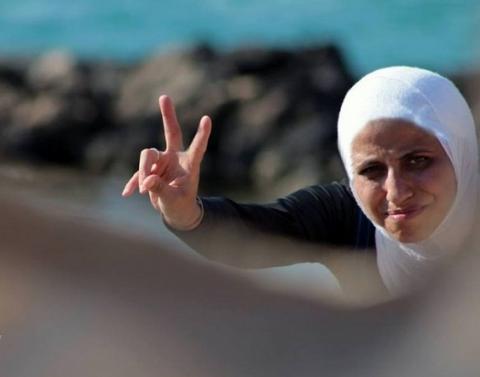
(Geneva, September 20, 2018) – On September 20, 2018, Palestinian poet Dareen Tatour was released from Damoun prison after serving a five-month sentence for “incitement to violence” and “support for terror organisations” in relation to her poetry and social media activity.
On July 31, Tatour was sentenced by an Israeli court to five months in prison, but as she had already served three months, she was due to serve only the remaining two months, starting from August 8. On September 19, Tatour’s family received a phone call informing them that she would be released the following day.
Upon her release, Tatour told reporters that she is “very happy to have freedom” after “three years in prison, remand, house arrest with an electronic cuff and again house arrest".
"At last I'm free, and I will continue writing. I will not stop. [...] The whole case was about a poem," she continued.
"At last I'm free, and I will continue writing."https://t.co/AOmWROBziJ
— Haaretz.com (@haaretzcom) September 20, 2018
Since Tatour was solely prosecuted for the exercise of her right to freedom of expression, Alkarama sought the urgent intervention of the United Nations Special Rapporteur on freedom of opinion and expression, David Kaye, on December 15, 2017.
On September 20, Alkarama reiterated its request that the UN expert remind the Israeli authorities of their obligation to respect the fundamental right of freedom of opinion and expression.
Background on Tatour’s case
In the early hours of the morning on October 11, 2015, officers of the Nazareth Police, escorted by a unit of Israel’s Border Police, raided Tatour’s home, and arrested her without presenting a warrant nor providing any reasons for the arrest.
While in custody, she was forced to sign an investigation report that she was not allowed to read beforehand. In fact, Tatour was not informed of the charges against her until November 2, 2015, when she was indicted with “incitement to violence” and “support for terror organisations” by the Magistrates’ Court in Nazareth. The two charges were based on her poetry, as well as her activity on social media.
On October 3, Tatour had posted a video to YouTube of a reading of her poem “Resist, My People, Resist Them”, which she then shared on Facebook. During her trial, which began on April 13, 2016, the prosecution and defence debated the translation of certain passages of the poem.
In the poem, Tatour used the word “shahid” (شهيد), an Arabic term for “martyr”. The prosecution claimed that the word “shahid”, when grammatically adjusted into Hebrew, refers to Palestinians who were killed while carrying out attacks on Israelis. However, the defence argued that this evidence was based on a mistranslation of the poem, and, in fact, the word is used to refer to individuals who had been killed wrongfully.
In her poem, Tatour referred to several cases of Palestinians who were killed by the Israeli army or Israeli settlers. The line “As for Hadil, they sniped her in public,” refers to the case of 19-year-old student Hadeel al-Hashlamon, who was shot by Israeli soldiers at a checkpoint in Hebron in September 2015.
Tatour also refers to 18-month-old Ali Dawabsheh, who died during an arson attack on his home in the village of Duma, carried out by Israeli settlers in the middle of the night on July 31, 2015. Ali’s parents, Saad and Reham, later succumbed to the injuries they sustained that night, while Ali’s older brother, Ahmed, was the only survivor of the attack.
In a video interview with AJ+ published in September 2016, Tatour stated: “the poem talks about a human issue we [Palestinians] experience every day, but it was wrongly translated, and so it transformed from a human poem into a poem of incitement, according to the Israeli law.”
Additional charges violate right to freedom of expression
Tatour’s indictment also mentioned a Facebook post of October 4, 2015, which contains a reference to Islamic Jihad’s call for a “continuation of the intifada” in the West Bank, as well as a photograph posted of Isra’a Abed, an Arab-Israeli woman who was shot by security officers in the Afula bus station, captioned with the phrase “I will be the next martyr.”
Tatour’s judicial harassment falls within the context of an increasing number of detentions of Palestinian due to their activity on social media. Since 2015, 280 Palestinians have been arrested for posts or “likes” on social media.
For more information or an interview, please contact media@alkarama.org (Dir: +41 22 734 1008)
